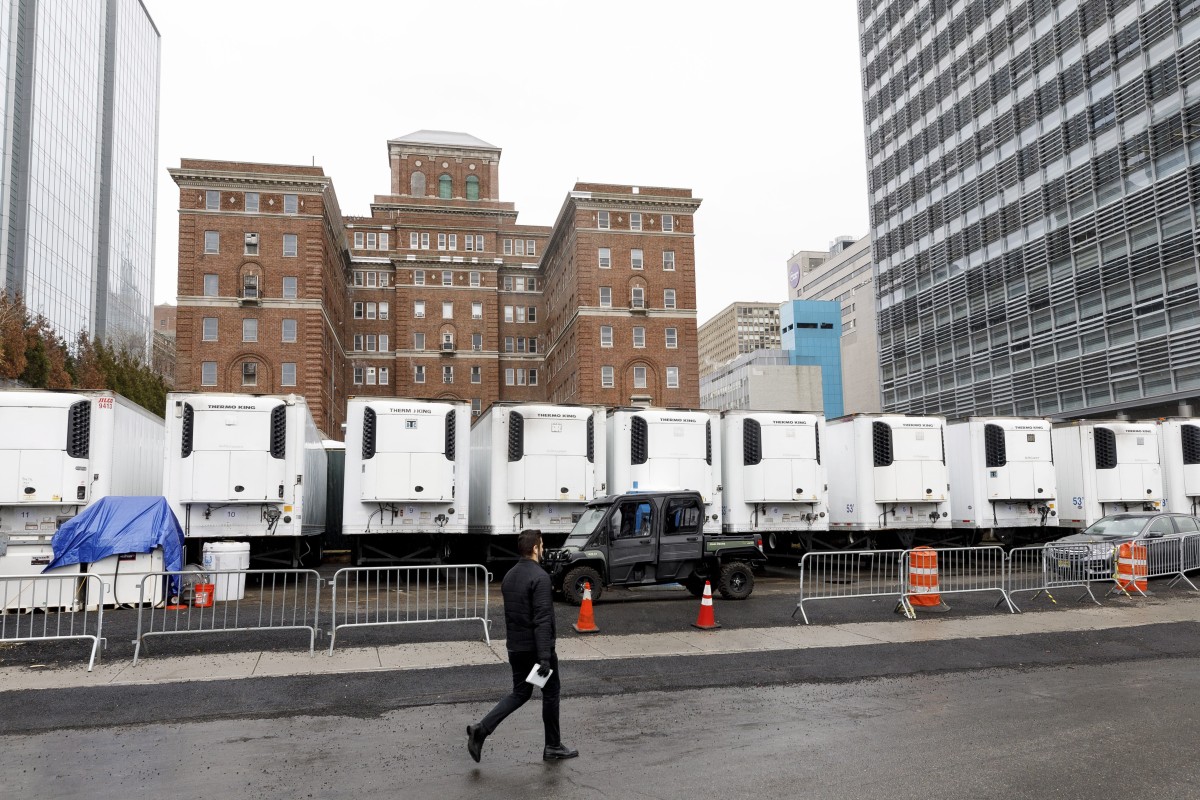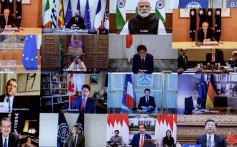The US topped a 2019 pandemic preparedness index. So why wasn’t it ready for Covid-19?
Deciding whether (MONOPOLY) capitalism or socialism (STATE CAPITALISM) is more suited for pandemic management is a false binary. The real issue is whether officials under each system are able to test, trace and contain the virus, and work out how to reopen economies
Andrew Sheng Published:11 Apr, 2020

Refrigeration trucks are lined up near the office of New York’s chief medical examiner to serve as an expanded morgue on April 3, as the city prepared for a growing number of coronavirus deaths. Photo: EPA-EFE
Who could have imagined that the Cold War could morph into a “cool war” and now a Covid-19 war? The Cold War was fought between the United States and the former Soviet Union, ending with the latter’s dissolution. The cool war between the US and China is still going on over trade.
As for the Covid-19 war, it is not about fighting each other, but protecting each country’s citizens against a coronavirus that does not distinguish between borders and political beliefs.
History will judge how, in this public health battle, authoritarian China has reported more than 3,300 deaths, whereas more than 14,000 have died in the democratic US.
There are four hard choices in this crisis: moral, informational, political and economic. A tough moral decision has to be made between lives and livelihoods.
Coronavirus: Is the gig economy dead, and should the self-employed worry?
Most governments have rightly chosen to protect lives by shutting down economies. But with the Organisation for Economic Cooperation and Development estimating a loss of 2 per cent of gross domestic product for every month of lockdown, economic costs are mounting.
This explains why the US president is all for reopening the economy as soon as possible. With estimates of deaths in the US falling to 60,000 by August, the issue is whether the US can afford to spend trillions to prevent more deaths.
Developing countries certainly can’t afford lockdowns. As it is, many of their citizens lack running water and soap, and can’t wash their hands frequently to stop the spread of coronavirus. The pandemic might push millions more into poverty.
In the post-Covid-19 future, the world economy will be reset
6 Apr 2020

he second choice is informational: do you believe scientists or politicians? On the one hand, Trump wants a timeline for restarting the economy but, on the other hand, infectious disease expert Anthony Fauci says the timeline is determined by the virus.
So far, the political leaders who heed scientific advisers have done best. The prime ministers of Singapore , Malaysia and New Zealand are to be commended for taking decisive action and enforcing lockdowns.
The third choice is political. Deciding whether capitalism or socialism is better suited for pandemic management is a false binary. The real issue is whether officials under either system are able to test, trace and contain the virus.
Food security of world’s poorest communities threatened by Covid-19 pandemic, warns UN food body
Back in October, the US was ranked as the country most prepared for pandemics in the Global Health Security Index published by the Johns Hopkins Centre for Health Security and The Economist Intelligence Unit. Britain was at No 2 and China, No 51.
In late November, before news of coronavirus cases in Wuhan broke, the US National Centre for Medical Intelligence warned of a disease outbreak in China that could pose a serious threat to US forces in Asia.
Back in October, the US was ranked as the country most prepared for pandemics in the Global Health Security Index published by the Johns Hopkins Centre for Health Security and The Economist Intelligence Unit. Britain was at No 2 and China, No 51.
In late November, before news of coronavirus cases in Wuhan broke, the US National Centre for Medical Intelligence warned of a disease outbreak in China that could pose a serious threat to US forces in Asia.
On January 29, Trump’s trade adviser, Peter Navarro, alerted the White House that a “full-blown coronavirus outbreak on US soil” could cost trillions of dollars and the health of millions. So why didn’t the vaunted US system kick in to prevent the spread of Covid-19?
To be fair, all bureaucracies are slow to react to new and uncertain challenges. Mauro Ferrari, the European Union’s top scientist, said he had proposed a special programme in March to combat the virus because “the very best scientists in the world should be provided with resources and opportunities to fight the pandemic, with new drugs, new vaccines, new diagnostic tools, new behavioural dynamic approaches based on science, to replace the oft-improvised intuitions of political leaders”.
However, his proposal “was passed on to different layers of European Commission administration, where I believe it disintegrated upon impact”. Ultimately, he resigned as president of the European Research Council, after failing to persuade the EU bureaucracy to take action.
Unfortunately, a “whole of government” approach is only possible if we are to able to knock sense into obstinate bureaucrats. The parts must work together to save the whole.
In Covid-19 spread, China and the West have reversed roles
19 Mar 2020

Last but not least, there is the matter of how to reopen the economy,
once the pandemic is brought under a semblance of control. The reality is that there is no one formula, model or theory that can guide us, given that different countries have such different values, resources and institutions.
One thing is certain. The market cannot respond without the backing of the state. Indeed, there is no best practice when it comes to deciding how to reopen an economy. Each country will have to experiment, based on the best data on both public health and the economy.
Free-market ideology has not prepared us for this, because we have good information on the largest corporations, but little up-to-date data on the balance sheets of the households and small businesses that are feeling the brunt of the lockdowns.
Meanwhile, rich countries are dropping “helicopter money”, as if helicopters can put out raging forest fires by randomly spraying water. The successful economies are those that are able to target money to help those who need it most.
To put it another way, economies need to test, trace and target, just as health systems do to tackle the virus. In practical terms, this means applying tools that best fit the conditions on the ground.
In fighting the war against Covid-19, success is relative, but failure is contagious. If we fail as individuals and as a community to make hard choices, more lives and livelihoods will be lost. This is the pandemic box we have opened up.
Andrew Sheng writes on global issues from an Asian perspective

Andrew Sheng is a former central banker and financial regulator, currently distinguished fellow at the Asia Global Institute, University of Hong Kong. He writes widely on Asian perspectives on global issues, with columns in Project Syndicate, Asia News Network and Caijing/Caixin magazines. His latest book is “Shadow Banking in China”, co-authored with Ng Chow Soon, published by Wiley.
once the pandemic is brought under a semblance of control. The reality is that there is no one formula, model or theory that can guide us, given that different countries have such different values, resources and institutions.
One thing is certain. The market cannot respond without the backing of the state. Indeed, there is no best practice when it comes to deciding how to reopen an economy. Each country will have to experiment, based on the best data on both public health and the economy.
Free-market ideology has not prepared us for this, because we have good information on the largest corporations, but little up-to-date data on the balance sheets of the households and small businesses that are feeling the brunt of the lockdowns.
Meanwhile, rich countries are dropping “helicopter money”, as if helicopters can put out raging forest fires by randomly spraying water. The successful economies are those that are able to target money to help those who need it most.
To put it another way, economies need to test, trace and target, just as health systems do to tackle the virus. In practical terms, this means applying tools that best fit the conditions on the ground.
In fighting the war against Covid-19, success is relative, but failure is contagious. If we fail as individuals and as a community to make hard choices, more lives and livelihoods will be lost. This is the pandemic box we have opened up.
Andrew Sheng writes on global issues from an Asian perspective

Andrew Sheng is a former central banker and financial regulator, currently distinguished fellow at the Asia Global Institute, University of Hong Kong. He writes widely on Asian perspectives on global issues, with columns in Project Syndicate, Asia News Network and Caijing/Caixin magazines. His latest book is “Shadow Banking in China”, co-authored with Ng Chow Soon, published by Wiley.
No comments:
Post a Comment